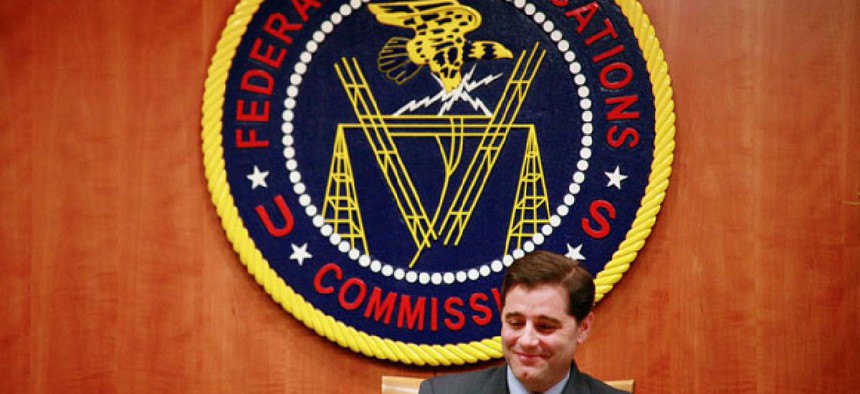FCC vote launches spectrum auction process

Julius Genachowski called the auctions "a win for broadcasters." Flickr user wiredbike
As authorized by Congress, the FCC plans to engineer a “reverse auction."
The Federal Communications Commission voted on Friday to begin a process of reallocating spectrum from broadcasters to wireless broadband.
As authorized by Congress, the FCC plans to engineer a “reverse auction,” in which broadcasters sell their spectrum licenses back. The FCC will “repack” the spectrum into usable units, and then sell licenses for that spectrum to wireless companies in an auction. The funds raised by the auction will also go toward developing a nationwide public-safety communications network.
Wireless companies are eager to get their hands on more spectrum to satisfy a growing demand for mobile broadband services.
“Consumer demand for advanced wireless services is growing rapidly, and more spectrum must be made available for mobile services in order to meet consumers' needs,” Verizon’s Tom Tauke said in a statement.
The FCC’s vote begins a process in which the agency will solicit input on how to implement the auctions. The official report, approved by the commission, is about 150 pages long and will be released by sometime next week, staffers said.
Agency officials wouldn’t speculate, however, on how much spectrum will be available for the auctions. Broadcasters resisted any measures to force them to give up spectrum; and it is difficult to determine how many broadcasters may ultimately decide to sell their licenses voluntarily.
The FCC encouraged broadcasters to participate by pointing out the economic advantages. “Incentive auctions are a win for broadcasters – both those that will take advantage of a once-in-a-lifetime financial opportunity, and those that will choose to continue to be a part of an even healthier and diverse broadcast marketplace,” FCC Chairman Julius Genachowski said.
The vote drew praise from lawmakers on both sides of the aisle. Senate Commerce Committee Chairman Jay Rockefeller, D-W.Va., said he is optimistic that broadcasters will agree to give up some of their spectrum, and House Energy and Commerce Communications and Technology Subcommittee Chairman Greg Walden, R-Ore., said that the process will free up spectrum, create jobs, and help build the emergency network.
Wireless companies also lauded a separate FCC action in which the commissioners voted to rethink how the agency regulates how much spectrum a company can use. The proposed rule-making will ask the public whether the commission should retain the case-by-case approach it currently uses when evaluating spectrum transactions or if it should move to a more standardized approach.
AT&T, whose merger with T-Mobile was blocked by the FCC over concerns about spectrum, praised the move.
“Wireless carriers need a clear and reliable understanding of when and under what circumstances spectrum acquisitions will be permitted, something we do not have today,” AT&T Vice President Joan Marsh said in a statement. “With today’s FCC action, spectrum policy can now be taken out of merger-specific proceedings, placed in an industry-wide, open, and transparent proceeding, and ultimately subjected to judicial review.”
NEXT STORY: LightSquared proposes vacating disputed spectrum





